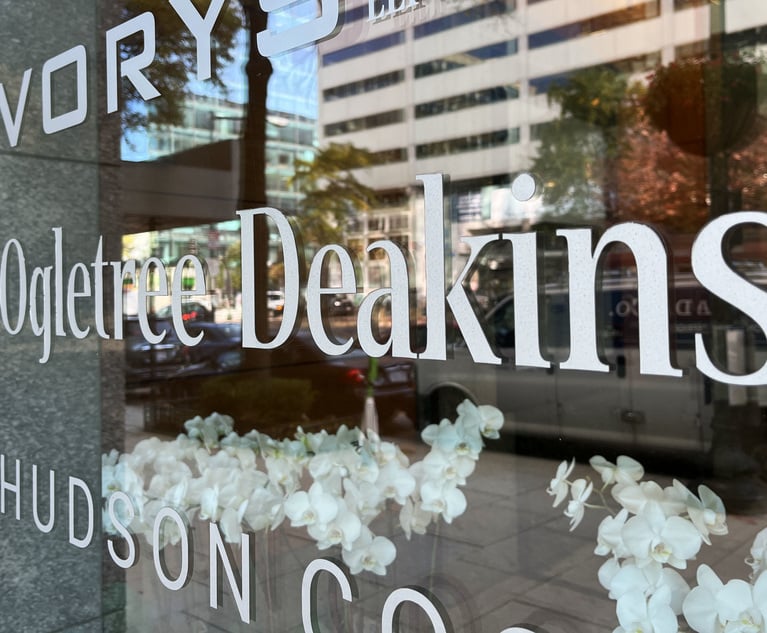How Companies Are Reacting to Overtime Rule Uncertainty
Companies have taken different approaches to the uncertainty over the Obama-era overtime rule that was challenged in court.
October 06, 2017 at 02:15 PM
6 minute read

Companies have open questions about the fate of the Obama-era overtime regulations, despite a Texas federal court ruling nixing rules that would have doubled the salary threshold for workers eligible for time and half pay and extended greater pay to millions of more workers.
The answers will hinge on how the U.S. Labor Department moves to revise the Obama administration's rules. Meanwhile, companies—many of which were unable to wait for the courts to resolve the dispute—had to make decisions on whether to comply or keep the status quo and continue to prepare for however the regulations ended up.
“Employers have been left in limbo,” said Lori Brown, president and chief operating officer of ComplianceHR at a webinar this week that highlighted issues about the overtime rule. “It's an ever-changing compliance dilemma.”
The Labor Department under Secretary R. Alexander Acosta has until Oct. 31 to decide whether it will appeal the Texas ruling that struck down a rule that would have increased the overtime salary threshold for workers from $23,660 to $47,476. The regulation was set to take effect Dec. 1, 2016. Earlier, an injunction blocked it from taking effect. Several states and the U.S. Chamber of Commerce sued to spike the overtime rule.
The litigation is not settled, said Tammy McCutchen, a principal at Littler Mendelson and former administrator for the Labor Department's wage and hour division. The Labor Department could still appeal the lower court's decision to the Fifth Circuit and meanwhile, the agency has sought comments about the future of overtime regulations.
“Here's the big question: Is the 2016 rule finally dead?” McCutchen said. “I'm sorry to say it's not quite dead yet.”
She said the question of whether the appellate process will start anew if the Labor Department decides to continue to case in the Fifth Circuit is “anyone's guess.”
A survey by Littler Mendelson and ComplianceHR found that 50 percent of companies that responded had changed their policies to comply with the 2016 rule. Among those 900 responses, nearly half made plans to comply and did not implement any changes, and 11 percent did not comply with the rule. The companies responded in various ways, either reclassifying employees or raising salaries. Others reduced benefits.
McCutchen was the architect of changes to the overtime threshold in 2004, the last time the salary levels were adjusted. She also has advised the U.S. Chamber of Commerce, the business association that is spearheading the push against the rules.
 Labor Secretary R. Alexander Acosta
Labor Secretary R. Alexander AcostaMcCutchen said many companies were puzzled when the new Labor Department weighed into the overtime case this summer. Labor regulators argued not for the specific salary threshold but instead said the agency had the authority to set a number. Acosta has said that a decade is too long to go without looking at how much the threshold should be raised.
Cheryl Stanton, the Trump administration's nominee for the wage-and-hour chief, was grilled about the future of overtime at a hearing this week. She told the Senate Health, Education, Labor and Pensions Committee she would determine what the Labor Department's legal chances would be in any continued court fight over the regulation.
“The question I would ask is whether if we fight this or would we want to promulgate another rule that would more likely withstand litigation that would go into effect faster. Would that get us protections faster?” Stanton said. She added: “I don't think there is any dispute that it has been a long time since that salary test was adjusted. It's time to look at it and find a better benchmark today.”
Further muddying the waters, a lawsuit against Chipotle in New Jersey federal court contends the Texas court injunction did not apply to companies but only the power of the Labor Department to enforce the regulation. The suit claims that the company altered employee status in anticipation of the changes in 2016 and then reversed course.
The Littler/ComplianceHR survey said the key question for companies to focus on was what actions employers should take in anticipation of complying with the final rule. Cost estimates were based on the assumption that nonexempt employees, eligible for overtime, would remain salaried.
Of those that complied, 76 percent increased salaries; 7.2 percent increased salaries but reduced benefits; 77 percent reclassified workers; 6.4 percent reduced head count; and roughly 12 percent raised prices for customers. McCutchen said some companies responded by taking away employees' work smartphones and limiting travel time.
“Many employers were making changes to deal with the cost that were not beneficial to employees,” she said.
Inside the Beltway, the regulatory ball is rolling with stakeholders and observers proposing specific changes. The comment period closed Sept. 25. One big question will be: What should the salary level be? There were 157,587 total responses.
Among employers, most supported a modest increase to the minimum salary level. Few on the employer side support multiple salary levels or automatic updates to the salary level.
The Labor Department is expected to post a notice of rulemaking, and the administrative process to craft a rule will not be short—perhaps extending well into next year.
In the meantime, McCutchen offered this advice to employers: “Even though we have some time, you should continue to prioritize compliance with the 2016 final rule. There will be an increase coming, it's just a matter of how high. That's my bottom line here. Employers need to keep their focus.”
Erin Mulvaney, based in Washington, covers labor and employment. Contact her at [email protected]. On Twitter: @erinmulvaney.
This content has been archived. It is available through our partners, LexisNexis® and Bloomberg Law.
To view this content, please continue to their sites.
Not a Lexis Subscriber?
Subscribe Now
Not a Bloomberg Law Subscriber?
Subscribe Now
NOT FOR REPRINT
© 2025 ALM Global, LLC, All Rights Reserved. Request academic re-use from www.copyright.com. All other uses, submit a request to [email protected]. For more information visit Asset & Logo Licensing.
You Might Like
View All
3rd Circuit Strikes Down NLRB’s Monetary Remedies for Fired Starbucks Workers

‘A Force of Nature’: Littler Mendelson Shareholder Michael Lotito Dies At 76
3 minute read
Employers Scramble to Get Immigration Records in Order Ahead of Trump Crackdown
6 minute read
Trending Stories
- 1CLOSED: These Georgia Courts Won't Open Jan. 10
- 2Volkswagen Hit With Consumer Class Action Alleging Defective SUV Engines
- 3‘Be Comfortable With the Uncomfortable’
- 4Here's What Corporate Litigators Expect Delaware Courts to Address in 2025
- 5Adapting to AI and the Needs of Lawyers Will Be Key For Shutts & Bowen, Says Incoming Ft. Lauderdale Leader
Who Got The Work
Michael G. Bongiorno, Andrew Scott Dulberg and Elizabeth E. Driscoll from Wilmer Cutler Pickering Hale and Dorr have stepped in to represent Symbotic Inc., an A.I.-enabled technology platform that focuses on increasing supply chain efficiency, and other defendants in a pending shareholder derivative lawsuit. The case, filed Oct. 2 in Massachusetts District Court by the Brown Law Firm on behalf of Stephen Austen, accuses certain officers and directors of misleading investors in regard to Symbotic's potential for margin growth by failing to disclose that the company was not equipped to timely deploy its systems or manage expenses through project delays. The case, assigned to U.S. District Judge Nathaniel M. Gorton, is 1:24-cv-12522, Austen v. Cohen et al.
Who Got The Work
Edmund Polubinski and Marie Killmond of Davis Polk & Wardwell have entered appearances for data platform software development company MongoDB and other defendants in a pending shareholder derivative lawsuit. The action, filed Oct. 7 in New York Southern District Court by the Brown Law Firm, accuses the company's directors and/or officers of falsely expressing confidence in the company’s restructuring of its sales incentive plan and downplaying the severity of decreases in its upfront commitments. The case is 1:24-cv-07594, Roy v. Ittycheria et al.
Who Got The Work
Amy O. Bruchs and Kurt F. Ellison of Michael Best & Friedrich have entered appearances for Epic Systems Corp. in a pending employment discrimination lawsuit. The suit was filed Sept. 7 in Wisconsin Western District Court by Levine Eisberner LLC and Siri & Glimstad on behalf of a project manager who claims that he was wrongfully terminated after applying for a religious exemption to the defendant's COVID-19 vaccine mandate. The case, assigned to U.S. Magistrate Judge Anita Marie Boor, is 3:24-cv-00630, Secker, Nathan v. Epic Systems Corporation.
Who Got The Work
David X. Sullivan, Thomas J. Finn and Gregory A. Hall from McCarter & English have entered appearances for Sunrun Installation Services in a pending civil rights lawsuit. The complaint was filed Sept. 4 in Connecticut District Court by attorney Robert M. Berke on behalf of former employee George Edward Steins, who was arrested and charged with employing an unregistered home improvement salesperson. The complaint alleges that had Sunrun informed the Connecticut Department of Consumer Protection that the plaintiff's employment had ended in 2017 and that he no longer held Sunrun's home improvement contractor license, he would not have been hit with charges, which were dismissed in May 2024. The case, assigned to U.S. District Judge Jeffrey A. Meyer, is 3:24-cv-01423, Steins v. Sunrun, Inc. et al.
Who Got The Work
Greenberg Traurig shareholder Joshua L. Raskin has entered an appearance for boohoo.com UK Ltd. in a pending patent infringement lawsuit. The suit, filed Sept. 3 in Texas Eastern District Court by Rozier Hardt McDonough on behalf of Alto Dynamics, asserts five patents related to an online shopping platform. The case, assigned to U.S. District Judge Rodney Gilstrap, is 2:24-cv-00719, Alto Dynamics, LLC v. boohoo.com UK Limited.
Featured Firms
Law Offices of Gary Martin Hays & Associates, P.C.
(470) 294-1674
Law Offices of Mark E. Salomone
(857) 444-6468
Smith & Hassler
(713) 739-1250










